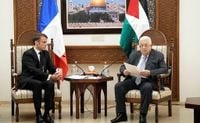French President Emmanuel Macron's recent announcement that France will recognize a Palestinian state at the United Nations General Assembly in September 2025 has ignited a firestorm of international reactions, highlighting deep divisions over the Israeli-Palestinian conflict amid one of the most severe humanitarian crises in Gaza.
On July 24, 2025, Macron declared on the social media platform X that France, the most powerful European nation and the only permanent member of the UN Security Council to take such a step, would formally recognize Palestine. He framed the decision as consistent with France's historic commitment to a just and lasting peace in the Middle East, emphasizing the need to “build the State of Palestine, guarantee its viability, and ensure that by accepting its demilitarization and fully recognizing Israel, it contributes to the security of all in the region.”
Macron's announcement came amid escalating suffering in Gaza, where a deepening hunger crisis has claimed over 120 lives, mostly children, according to reports from the enclave’s health ministry. The humanitarian disaster has intensified calls from global leaders and aid organizations for urgent relief and a ceasefire. Macron himself underscored the urgency, stating, "The urgent thing today is that the war in Gaza stops and the civilian population is saved." This humanitarian backdrop heavily influenced France’s decision, reflecting growing frustration with the ongoing conflict and the stalemate in peace negotiations.
Despite Macron's intentions, the move has met fierce opposition from Israel and the United States. Israeli Prime Minister Benjamin Netanyahu “strongly condemned” the recognition, arguing that it “rewards terror and risks creating another Iranian proxy, just as Gaza became.” Netanyahu warned that a Palestinian state under current conditions would become “a launch pad to annihilate Israel, not to live in peace beside it,” asserting, “The Palestinians do not seek a state alongside Israel; they seek a state instead of Israel.”
U.S. Secretary of State Marco Rubio echoed these sentiments, calling Macron’s decision “a slap in the face to the victims of October 7th” — referring to the deadly Hamas attack on Israel in 2023 — and condemned it as a reckless move that “only serves Hamas propaganda and sets back peace.” Former U.S. President Donald Trump dismissed the announcement as lacking significance, stating at the White House, “What he says doesn’t matter... that statement doesn’t carry weight.”
Adding to the criticism, Mike Huckabee, the U.S. Ambassador to Israel, ridiculed the French decision on social media, sarcastically suggesting that France had not specified the territory of the new state and joking that it might be called “Franc-en-Stine” on the French Riviera. Such reactions underscore the diplomatic rift Macron's announcement has caused with key Western allies.
Within France, the decision also sparked controversy. The Conseil Représentatif des Institutions Juives de France (CRIF), representing the country's Jewish community, condemned the move as “a moral failing, a diplomatic mistake, and a political danger.” CRIF highlighted that Macron's previously stated conditions for recognition — including the release of hostages held by Hamas and Hamas's surrender — had not been met. A June 2024 poll by Institut Français d’Opinion Publique (IFOP) showed that 78% of the French public opposed recognizing a Palestinian state without such preconditions.
Legal experts have weighed in on the implications of France’s recognition. Arsen Ostrovsky, an Israeli human rights lawyer and CEO of the International Legal Forum, emphasized that recognition alone does not confer statehood under international law. He pointed out that the Palestinian Authority lacks defined borders, the capacity for effective diplomatic relations, and a genuine commitment to peace. “You can recognize Palestine as a state, but that does not make it a state,” Ostrovsky said, describing the move as “no more than a performative gesture and stunt” unlikely to advance peace or alleviate suffering in Gaza.
Ostrovsky further warned that France’s recognition could derail ongoing hostage-for-ceasefire negotiations. He noted that US envoy Steve Witkoff and the Israeli negotiating team had recently left Doha after Hamas hardened its demands, and suggested that gestures like France’s announcement and joint international condemnations of Israel might embolden Hamas’s intransigence. “These kinds of gestures remove any incentive for Hamas to compromise or take meaningful steps toward a ceasefire or the release of hostages,” he said.
Adding to the legal analysis, Ambassador Alan Baker and Lt. Col. (res.) Maurice Hirsch outlined in a May 2025 report that the 1933 Montevideo Convention sets four criteria for statehood: a permanent population, defined borders, a functioning government, and the capacity to engage in foreign relations. They concluded that the Palestinian leadership does not meet these standards and that unilateral recognition violates agreements made in the 1990s, which stipulated that statehood and borders be resolved through negotiations.
France’s announcement also triggered calls within Israel for retaliatory measures. Hirsch suggested closing the French consulate in Jerusalem, which serves Palestinians, while Ostrovsky proposed halting tax revenue transfers to the Palestinian Authority and suspending security cooperation. Ostrovsky also argued that international funding for the United Nations Relief and Works Agency for Palestine Refugees in the Near East (UNRWA) should end, reasoning that if Palestinians have a recognized state, they would no longer qualify as refugees.
Meanwhile, political developments in Israel appear to be moving in the opposite direction. Just a day before Macron’s announcement, the Israeli Knesset passed a nonbinding resolution supporting Israeli sovereignty over the West Bank and the Jordan Valley, with 71 members in favor and 13 opposed. Some Israeli politicians, including far-right figures like Finance Minister Bezalel Smotrich, have called for immediate annexation of these territories, framing it as a response to international pressure and recognition moves like France's.
Internationally, reactions have been mixed. Saudi Arabia welcomed Macron’s decision and urged other nations to follow. Several European countries, including Norway, Spain, Ireland, and Slovenia, had already recognized Palestinian statehood following the outbreak of war with Hamas in October 2023. Irish Taoiseach Micheál Martin called France’s move “very significant” and important for advancing peace efforts and a two-state solution, while Spanish Prime Minister Pedro Sanchez emphasized the necessity of protecting the two-state framework against Israeli actions.
Conversely, Germany stated it has no plans to recognize a Palestinian state in the short term, prioritizing progress toward a two-state solution and Israel’s security. Britain, under Prime Minister Keir Starmer, has expressed support for Palestinian statehood in principle but insists on a ceasefire as a prerequisite for recognition. Starmer faces internal party pressure to endorse statehood but has so far stopped short of doing so.
China’s Foreign Ministry reiterated support for a two-state solution as the only viable path to resolving the conflict, reflecting widespread international consensus on this approach despite diverging tactics and timelines.
Macron’s announcement, therefore, marks a significant moment in the Israeli-Palestinian saga. It reflects growing frustration with the status quo, humanitarian desperation in Gaza, and a desire among some global powers to shift the diplomatic landscape. Yet, it also exposes the profound complexities and entrenched positions that make peace elusive.
As Ostrovsky put it, Hamas’s public gratitude for France’s recognition should serve as a stark warning. “When Hamas says thank you, that should be a clear indication that France is on the wrong side of history,” he said. Macron’s bold step may well be the biggest diplomatic victory Hamas has achieved since the devastating attacks of October 7, 2023, underscoring the fraught and uncertain path ahead for peace in the Middle East.


